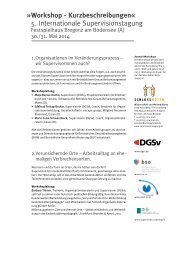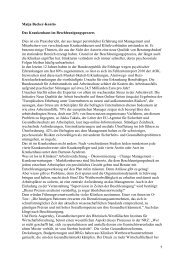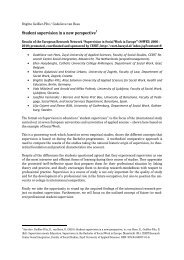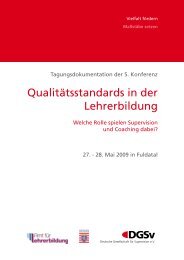Internationale Institutionen und nichtstaatliche Akteure
Internationale Institutionen und nichtstaatliche Akteure
Internationale Institutionen und nichtstaatliche Akteure
Erfolgreiche ePaper selbst erstellen
Machen Sie aus Ihren PDF Publikationen ein blätterbares Flipbook mit unserer einzigartigen Google optimierten e-Paper Software.
from any sort of ethics conditionality attached<br />
to development assistance or other<br />
benefits.<br />
“The new heavyweights from the South<br />
have to lay their cards on the table”<br />
You mention the problem of non-compliance.<br />
In the absence of a global government, how<br />
can the global community ensure that global<br />
rules and principles are respected? And<br />
who would most probably be the major “rule<br />
breakers”?<br />
Fues: In the same way as there exists organised<br />
crime at the national level, we can<br />
expect that certain “rogue actors” of global<br />
governance will not abide by ethical norms,<br />
so we will have to find a way to constrain<br />
them. Such malevolent actors could be authoritarian<br />
governments or private entities,<br />
for example from the business sector. Effective,<br />
independent mechanisms of monitoring<br />
and adjudication have to be established, with<br />
coercive power to a certain extent. In a key<br />
area of global governance – trade – we already<br />
have well functioning sanctioning mechanisms<br />
<strong>und</strong>er the WTO. Conflicts are dealt<br />
with by impartial dispute settlement bodies.<br />
Numerous countries, weak and strong, successfully<br />
make use of this arrangement. Of<br />
course, this presupposes that these countries<br />
forgo part of their sovereignty to a supranational<br />
authority. The key challenge here is<br />
how to transfer this enlightened <strong>und</strong>erstanding<br />
of national sovereignty to other areas of<br />
global governance.<br />
Mallavarapu: Indeed, the key obstacle<br />
is that of national sovereignty. Unfortunately,<br />
I think that the global community has not<br />
yet fully internalised a feeling of “ we-ness”.<br />
Global institutions might play a crucial role<br />
in creating some sort of global identity, but<br />
in the meantime, traditional notions of sovereignty<br />
prevail. This is regrettable in an increasingly<br />
global world, and it certainly is<br />
part of the problem, but that is where we<br />
are. The global community has elements of a<br />
deeper constitutionalism present, yet the tendency<br />
for countries is also to lapse back to<br />
various national logics.<br />
Fues: I would not be that pessimistic. As<br />
I said, some mechanisms are already there:<br />
The WTO has an impartial process of dispute<br />
settlement, all WTO members are subject<br />
to it. Or take the human rights conventions,<br />
where shadow reports from non-state<br />
actors exert significant pressure on deviant<br />
countries, although there is no formal<br />
sanctioning mechanism in the human rights<br />
area.<br />
Mallavarapu: Sanctioning mechanisms<br />
may work better in some domains than in<br />
others. However, the overall legitimacy of<br />
the institutions involved as well as the instrumentalities<br />
chosen remain crucial to scrutinise<br />
from the perspective of the disadvantaged.<br />
As long as they are perceived as unjust<br />
by virtue of being uninclusive they are not<br />
likely to be very enduring bases on which<br />
to erect a new architecture of global governance.<br />
Apprehensions also relate to double<br />
standards. For instance if we look at the International<br />
Criminal Court. What is the likelihood<br />
that any powerful head of State from<br />
the advanced industrialised world would be<br />
hauled up and questioned for his or her political<br />
excesses? In my view, the notion of perception<br />
is very important: We can have great<br />
rules and institutions, but as long as they are<br />
not universally viewed as fair, we are back to<br />
square one.<br />
Western scholars and policy-makers have<br />
been increasingly aware of the emergence of<br />
big developing countries – China, India, Brazil,<br />
South Africa and others – on the global<br />
stage. Do these countries play a particular role<br />
in the establishment of a normative global<br />
framework? And do they have the potential<br />
to achieve more global justice?<br />
Mallavarapu: This does offer an interesting<br />
conjuncture in history. What will be<br />
made of this opportunity is as yet an unsettled<br />
question. Realists in international relations<br />
are likely to remind us that the grammar<br />
of power is similar in different parts of<br />
the world. Once countries belong to the first<br />
league, they will represent their own new interests.<br />
I am more inclined to explore whether<br />
the Brazilian or Indian or Chinese styles of<br />
foreign policy will bring to bear a degree of<br />
exceptionalism stemming from their unique<br />
locations and backgro<strong>und</strong>s in world history.<br />
To take the case of India, this country was far<br />
more vocal on several issues (decolonisation,<br />
disarmament, development issues) <strong>und</strong>er the<br />
APuZ 34–35/2010 13
















